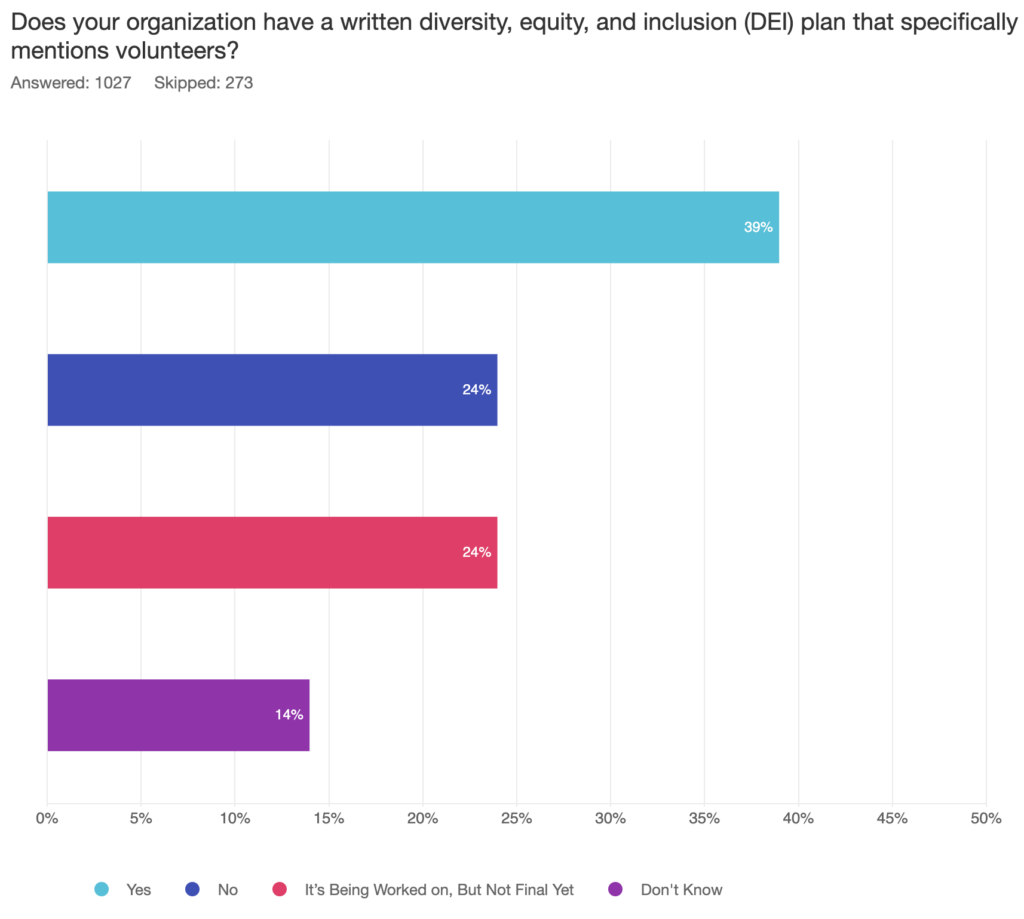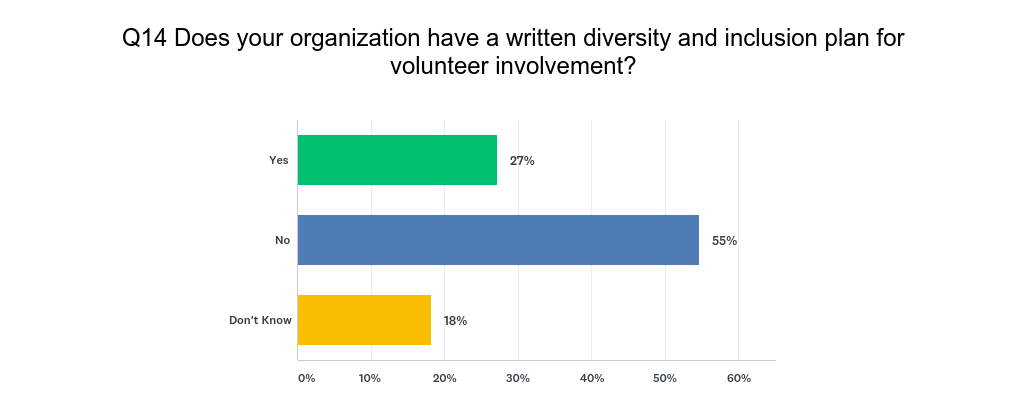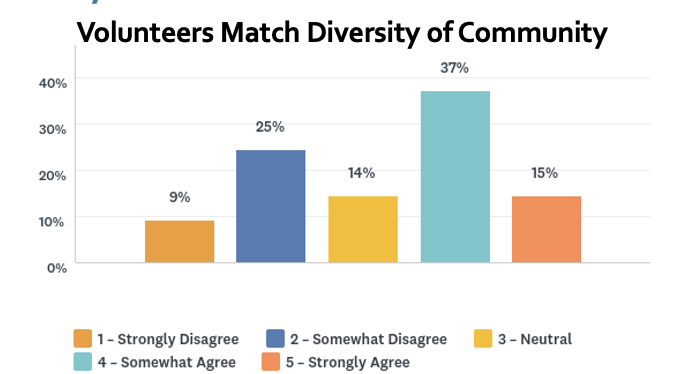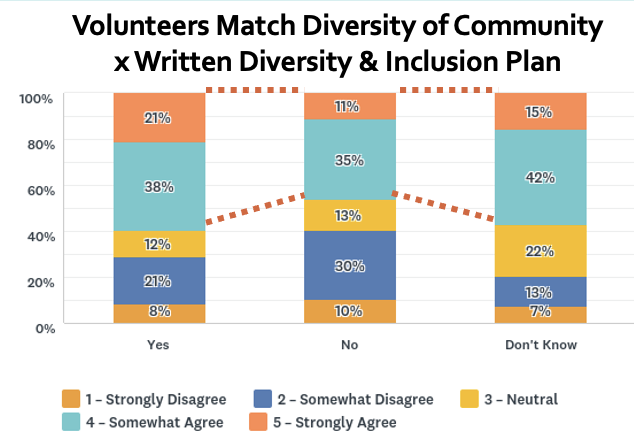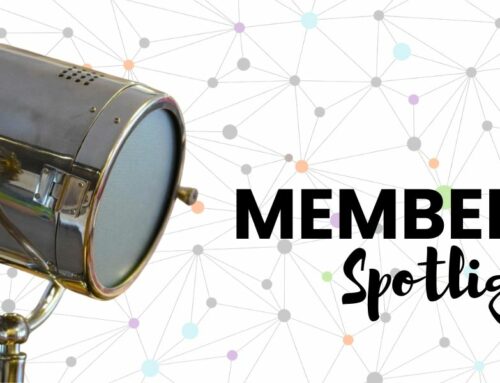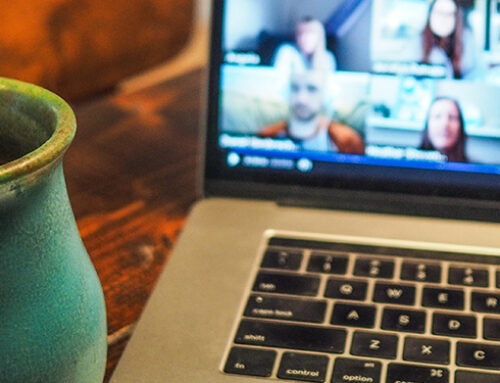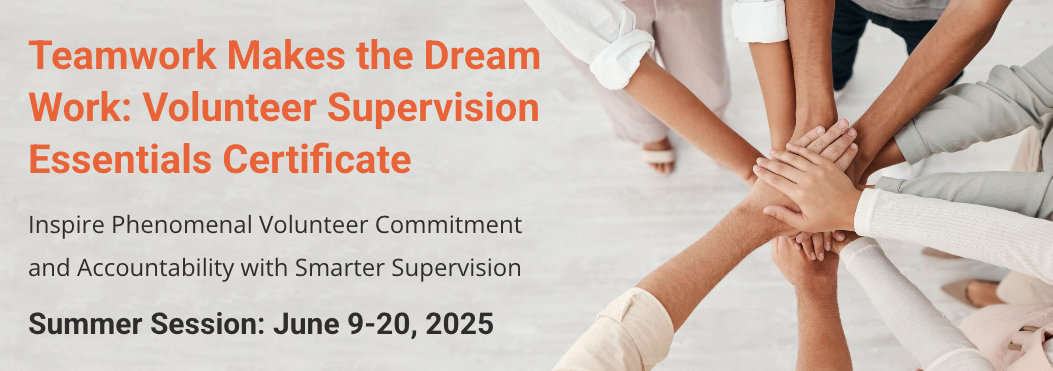December Pro RoundUp: Our Favorite DEI Resources for Nonprofits
Are you interested in promoting more inclusive volunteering, we’re sharing our top DEI resources for nonprofits to help you get off on the right foot.
Promoting diversity, equity, and inclusion (DEI) is top of mind for many volunteer organizations. And rightly so.
Our industry research shows that volunteer managers, as a whole, are less diverse than nonprofit employees who, in turn, are a less diverse group than the general public. In the United States, the most recent demographics of volunteer participation currently available show that those who volunteer are also less diverse than the general population.
So, the question naturally arises – is there a connection between these two realities? Does the lack of diversity in volunteer managers create a lack of equity in available opportunities for BIPOC volunteers and other volunteers from different walks of life who may not be actively welcome to service? Or worse – are they being discouraged from joining volunteer efforts because they feel excluded?
Deep questions for anyone who works in our field and is committed to ensuring that there is equitable access to making a difference for everyone in their community.
DEI Resources for Nonprofits: Hard Data on Our Progress as a Field
The good news is that preliminary data from our most recent Volunteer Management Progress Report (final data to be released in January 2022), shows that there has been increased interest and activity in creating DEI plans that are specific to volunteer involvement.
For the 2022 survey, 39 percent of volunteer managers reported that they have a written DEI plan in place that includes volunteers. Another 24 percent noted that their plan is in progress. 24 percent did not have a plan in place and 14 percent did not know.
Four years ago, for our 2018 report, only 27 percent had a written DEI plan for volunteer involvement. 55 percent did not have a plan in place, and 18 percent did not know if their agency had such a plan.
Even more interesting is the comparison between volunteer managers who feel their volunteer corps matches the community they serve and whether they had a DEI plan in place.
In 2022, we did not ask about the representative nature of volunteer demographics, but we can share the results from 2018.
Over half (52%) Strongly Agreed or Somewhat Agreed that the diversity of their current volunteer corps matches the community they serve (race/ethnicity, language, disability, sexual orientation, citizenship status, etc.).
For those who had a written diversity, equity, and inclusion plan in place for volunteers, that average rose seven percent (to 59%) of those who Strongly Agreed or Somewhat Agreed that the diversity of their current volunteer corps matches the community they serve.
For those that do not have a plan, the number who Strongly Agreed or Somewhat Agreed dropped 5% (to 46%).
Perhaps most interesting, was that the perception that volunteer diversity matched that of the community (those who Strongly Agreed or Somewhat Agree) was nearly the same for those who don’t know if they have a plan (57%) as for those who did have a DEI plan in place (59%), leading us to wonder whether implicit bias was at play.
Clearly, we still have work to do. But it is heartening to see evidence of increased awareness of the possibility of exclusion and that the more action is being taken currently to create a space for volunteers for all walks of life.
Top DEI Resources for Nonprofits: Some of Our Favorites
While progress has been made, many across the field of volunteer resources management still recognize the need to improve our practices around inclusive volunteerism.
And many are not sure what steps to take next.
So, this month’s Pro RoundUp is dedicated to helping you do better with a list of some of our favorite DEI resources. While this is not a comprehensive list of possible resources and organizations, we hope you find this curated list helpful.
-
The Centre for Global Inclusion –
The Centre for Global Inclusion is a nonprofit organization and resource for research and education for individuals and organizations in their quest to improve diversity and inclusion practices around the world. They offer the home of the Global Diversity, Equity & Inclusion Benchmarks (GDEIB), which is a free downloadable 78-page workbook that can be used by any organization that submits their user agreement.
The GDEIB includes 15 categories and concrete actions organizations can take to 1) create a better, equitable world for everyone, 2) advance an inclusive culture, and 3) improve organizational effectiveness. It also includes 275 benchmarks across five levels, so that organizations can track the progress of their journey.
It is the most comprehensive, data –driven roadmap we have encountered to support inclusivity and equity.
-
Equity in the Center –
Equity in the Center works to shift mindsets, practices, and systems within nonprofit and philanthropic organizations to increase racial equity. They offer training and publications and their Awake to Woke to Work report offer key insights into the race and equity gap within the nonprofit sector and offers advice on insights on how to build a race equity culture, based on the case studies of three organizations. The report includes seven key levers that build momentum toward an equitable organizational culture and identify the personal beliefs and behaviors, policies and processes and data points to assess an organization’s current level of maturity in each.
Their Suggested Learning Path is also an excellent resource for exploring from your own content, circumstances, and organizational goals.
-
Community Centric Fundraising (CCF) –
Community-Centric Fundraising is a model that is grounded in equity and social justice that prioritizes the community over individual organizations, fosters a sense of belonging and interdependence, presents this work not as individual transactions but as a holistic enterprise, and encourages mutual support amongst nonprofits and those who cultivate support for causes.
CCF’s work is grounded in 5 Values and 10 Principles of Community-Centric Fundraising that they encourage nonprofit staff and stakeholders to adopt in support of a healthier nonprofits that reduce harm and further social justice. Their hub includes essays, infographics, podcasts, and videos that offer straight talk about the state of the nonprofit sector from diverse points of view.
This content is a breath of fresh air, surfacing long-taboo subject with grace and strength.
-
Showing Up for Racial Justice –
If you are a white leader, with little experience in racial justice work, you may doubt whether your efforts to create a space for more inclusive volunteerism will be welcome, or if it is your place to educate others on bias and discrimination.
However, many impacted by racism would argue that the burden for change should rest on the shoulders of those who have enjoyed, willingly or not, the benefits and advantages of white privilege.
Showing Up for Racial Justice is an organization that offers “a home for white people working for justice.” Their resources include toolkits and their network of chapters and affiliates across the country work within their local communities. Through community organizing, mobilizing, and education, these chapters move white people to take action as part of a multi-racial majority for racial and economic justice.
-
Perception Institute –
Perception Institute is a collective of researchers, advocates, and strategists who translate psychology, neuroscience, and the social science research on race, gender, ethnic, and other identities into solutions that reduce bias and discrimination, and to promote belonging. They translate research into real-world solutions to help everyone navigate differences.
They explain in clear terms the concepts of Explicit Bias, Implicit Bias, Racial Anxiety, and Stereotype Threat, why they are important. And what can be done about them. They also share numerous publications that review and compile the current literature.
Their website offers an excellent intersection between theory and practice.
-
Nonprofit HR –
Nonprofit HR is a consulting firm focused on the talent management needs of the social sector and mission-driven organizations. While they focus on the management of paid employees, their thought leadership on diversity, equity, and inclusion can also be applied to unpaid volunteer talent.
Their 2019 and 2021 Nonprofit Diversity Practices survey reports offer insights into the DEI practices of organizations across North America and offers tips, metrics, and demographic data. Their Insight Library also includes numerous reports and pulse surveys on the progress of nonprofits, employee engagement, and talent management practices.
Nonprofit HR has been active throughout the pandemic in offering resources, free webinars, and advice to organization who are grappling with the COVID-19 pandemic and the call for racial justice in today’s communities.
-
Project Implicit –
Project Implicit is a non-profit organization and international collaborative of researchers who are interested in implicit social cognition. Since 1998, the organization has educated the public about bias by offering a free, anonymous self-test online.
Participants often express surprise at their test results, which often unearth implicit biases that are hidden or unrecognized by the individual themselves. It can be a startling revelation for many who believe they do not “see” a difference and those who simply want to know more about how their unconscious mind may impact their conscious decisions.
-
RespectAbility –
RespectAbility is a diverse, disability-led nonprofit that advances policies and practices that empower people with disabilities and fights stigmas so people with disabilities can fully participate in all aspects of community.
They offer a free resource, for and by a diverse range of stakeholders, aimed at creating an inclusive culture for people with disabilities that includes recruiting, accommodating, and promoting employees with disabilities and ensuring that events are accessible and welcoming.
-
Learning for Justice (formerly Teaching for Tolerance) –
Learning for Justice is the educational arm of the Southern Poverty Law Center, a longstanding organization with roots in the civil rights movement and that acts as a catalyst for racial justice in the South and beyond, working in partnership with communities to dismantle white supremacy, strengthen intersectional movements and advance the human rights of all people.
Based on the four domains of the Social Justice Standards (Identity, Diversity, Justice and Action), their Learning Plan Builder for K-12 educators and their free lessons provide curriculum for those working with children and young adults.
Their magazine and publications help educators improve their practices and builds their capacity around anti-bias education.
DEI Resources for Nonprofits: A few of Our Own Blog Posts for volunteer-driven Organizations
On our two websites, at VolunterPro and at Tobi Johnson & Associates, we have been writing about inclusivity in volunteerism for the past few years to challenge the status quo and help leaders of volunteers and volunteer-driven organizations do better.
Below are a few blog posts you might find helpful …
- Inclusive Volunteerism: What You Can Do Right Now to Be a Better Champion – https://tobijohnson.com/inclusive_volunteerism/
- How to Talk About Race & Volunteerism: Advice for Allies – https://volpro.net/race-and-volunteerism/
- Building Bridges to Better Volunteer Diversity & Inclusion – https://tobijohnson.com/volunteer-diversity-inclusion/
- How to Promote Volunteer Inclusion – https://volpro.net/how-to-promote-volunteer-inclusion/
- Why You Should Celebrate Black History Month with Your Volunteers – https://volpro.net/celebrate-black-history-month/
What Did We Miss? Which DEI Resources for Nonprofits Do You Recommend?
We’ve offered a few of our favorites, but there are plenty of talented people working toward social justice and a more equitable space for volunteerism.
So, let us know what we’ve missed.
If you have any favorites you’d like to share, please post them in the comments below.
We would love to help expand our limited list. 🙂


